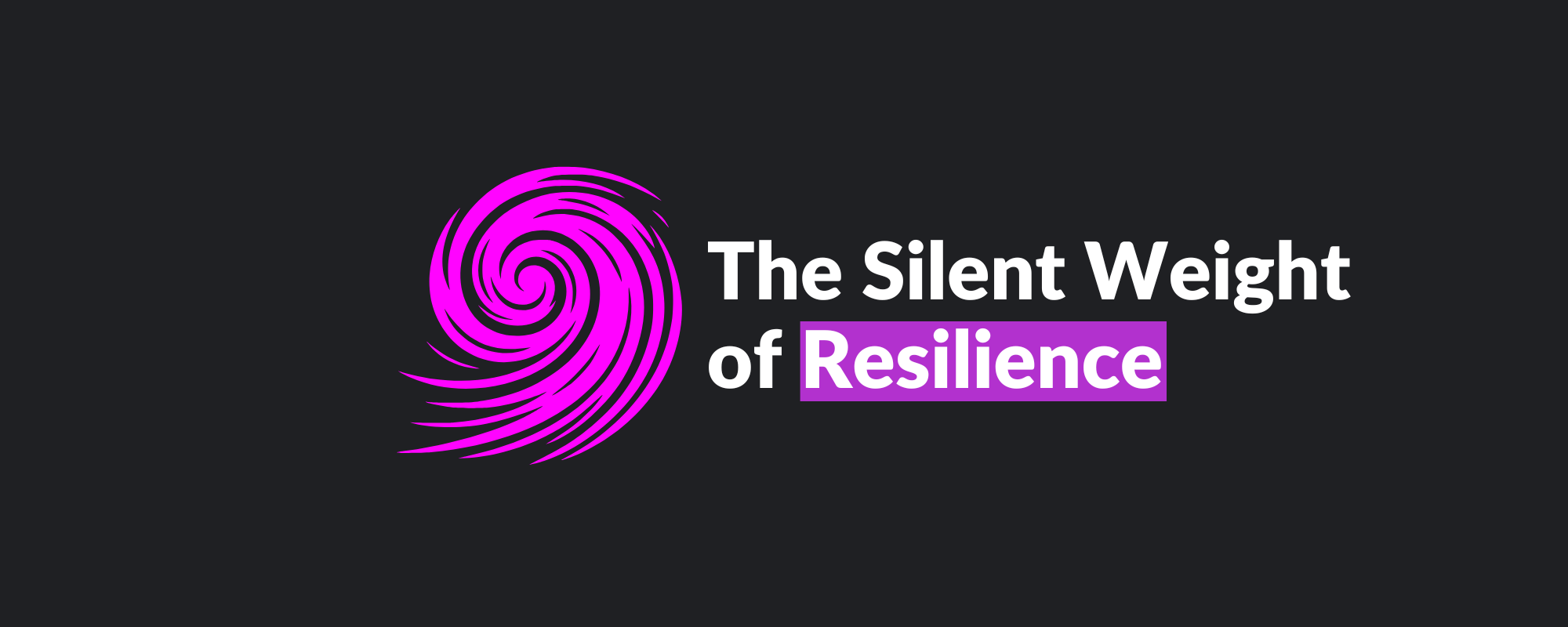The Silent Weight of Resilience

Resilience. It’s a word thrown around too easily, almost like confetti at a parade. The outside world loves to label people as “resilient.” They admire from a distance, nodding in approval, patting you on the back for your supposed strength. They don’t see the invisible weights, the quiet moments of breaking down when no one’s watching. The nights spent staring at the ceiling, wondering when it will get easier, when you can finally breathe.
You stand there, in the middle of it all, casually smiling back at them. You’ve mastered the art of being “fine.” After all, the world only asks for a brave face, not the truth behind it. They cheer you on, oblivious to the fact that their cheering does nothing to lighten the load. It’s not that you don’t appreciate the words of encouragement—it’s just that they barely scratch the surface of what’s really going on inside.
And that’s the thing about resilience—it’s not a shiny badge to be worn with pride. It’s the heavy armor you drag around because life has given you no other option. It’s sorrow disguised as a smile, sadness hidden behind casual replies like, “I’m good, really.”
What the outside world fails to understand is that resilience isn’t about bouncing back in some heroic fashion. It’s about enduring, sometimes quietly, sometimes painfully, but enduring nonetheless. And in the workplace, it’s easy to overlook the struggle in others. We’re all focused on deliverables, KPIs, and deadlines, but rarely do we stop to ask, “Are you okay? Really okay?”
The Struggle Everyone Carries
Here’s the truth: Every single person you meet is fighting a battle you know nothing about. It might be the colleague who always has a smile on their face during meetings, or the friend who never seems to have a bad day. But underneath that facade, there might be turmoil, anxiety, or even depression simmering just below the surface.
In this day and age, depression and anxiety have become almost as common as the morning coffee. According to the World Health Organization, more than 264 million people globally suffer from depression. It’s a staggering number, yet most people carry this burden quietly, hidden behind their “resilience.” We often hear phrases like, “Stay strong!” or “You’re so resilient!” but those words can feel empty when what someone truly needs is compassion, not just admiration for their strength.
Think about the last time you felt down, really down, and someone tried to cheer you up with a “You’ve got this!” Did it help? Maybe. But often, what helps more is just knowing someone is there, willing to sit in the mess with you, without needing to fix it. There’s an old saying: “Be kind, for everyone you meet is fighting a hard battle.” It’s true now more than ever.
Depression: The Quiet Epidemic
Depression is tricky. It doesn’t always look like sadness or tears. It can look like someone who has it all together. High-functioning depression is a term that gets thrown around more frequently nowadays. People with it might go to work, meet deadlines, and even excel, but they feel emotionally exhausted inside. The workplace can be an especially difficult environment for those struggling because there’s often a pressure to “keep it together” at all costs.
We’ve become masters at hiding our struggles behind busy schedules, pretending that everything is fine because, well, no one likes to appear “weak,” right? But we aren’t robots, and resilience doesn’t mean ignoring your mental health or pushing through in silence. True resilience is acknowledging the struggle and seeking support when needed.
Compassion in the Workplace
As colleagues, leaders, and even friends, we must be more than just spectators in someone else’s struggle. We need to be mindful of those quiet battles happening behind the scenes. Because let’s face it—workplaces often expect resilience as a default. But that’s not a license to be indifferent.
True leadership, true camaraderie, isn’t about applauding someone’s resilience from afar. It’s about leaning in and offering genuine support, recognizing when someone is carrying more than they can bear. It’s about kindness, not just in words, but in actions—being the person who listens, who checks in without judgment, who creates a space where it’s okay not to be okay.
Because resilience, at its core, isn’t built from hollow praise. It’s built from moments of human connection, from knowing you’re not alone in your struggle, that someone sees you, truly sees you. So let’s not just cheer from the sidelines. Let’s step into the arena with them, hand in hand, with kindness and compassion leading the way.
We’re all resilient, sure—but that doesn’t mean we should carry our burdens alone.



Discussion